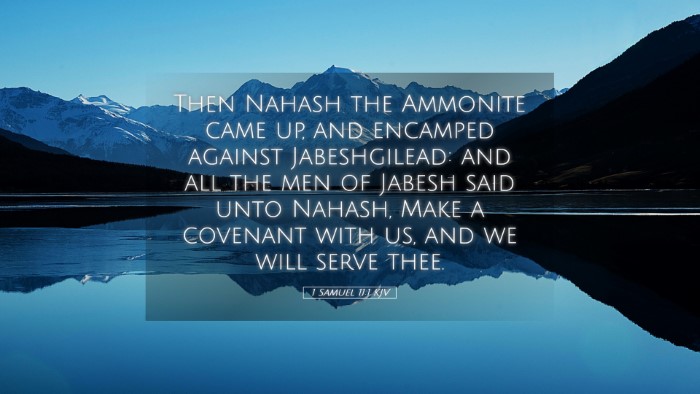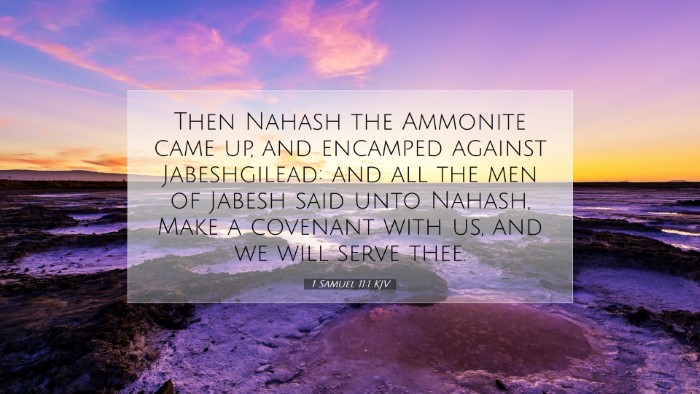Commentary on 1 Samuel 11:1
Verse Overview: 1 Samuel 11:1 states: "Then Nahash the Ammonite came up and encamped against Jabesh-gilead: and all the men of Jabesh said unto Nahash, Make a covenant with us, and we will serve thee."
Historical Context
The events detailed in this verse occur in a tumultuous time for the Israelites. Following Saul's anointing as king, the Ammonites pose a significant threat. Understanding the geopolitical landscape of this era is crucial, as the Ammonites were perennial enemies of Israel, often exploiting Israelite vulnerabilities.
Commentary Insights
Matthew Henry's Commentary
Matthew Henry emphasizes the dire situation of Jabesh-gilead, a city known for its isolation and strife. The request by the men of Jabesh to Nahash indicates a moment of surrender, highlighting Israel's weakened state under pressure from their adversaries.
Key Takeaway: Henry reflects on the themes of desperation and compromise, illustrating that the Israelites were willing to negotiate with their enemies rather than trust in God’s deliverance. This is a significant moment of faith and the trials faced by the Israelites during Saul's early kingship.
Albert Barnes' Notes on the Bible
Albert Barnes provides a thorough analysis of Nahash's character, suggesting he was a ruthless tyrant. The demands placed upon the men of Jabesh were not just martial; they were humiliating, indicating that Nahash intended to smite them severely, either by cutting out their right eyes or enforcing servitude.
Key Takeaway: Barnes points to the psychological warfare inherent in Nahash's approach. The Israelites find themselves in a precarious position — caught between their adversary's demands and their identity as God's chosen people, which speaks to broader issues of power and vulnerability in scriptural narratives.
Adam Clarke's Commentary
Adam Clarke offers a technical exposition of the term "Jabesh-gilead," noting its geographical and historical significance. Jabesh-gilead belonged to a tribe that was somewhat disengaged from the central Israelite authority, illustrating the fragmented nature of Israel during Saul's rise to power.
Key Takeaway: Clarke contextualizes the verse within the larger narrative of God’s deliverance and the test of Saul’s kingly leadership. This situation demonstrates God’s sovereignty, as even through strife, He prepares to showcase His power through Saul and the coming deliverance.
Theological Implications
- Faith in Crisis: This verse serves as a poignant reminder of how crises can challenge the faith of individuals and communities. The men of Jabesh are at a crossroads of surrender and conflict.
- Leadership and Responsibility: The interaction between Nahash and Jabesh-gilead highlights the complexities leaders face in times of crisis. Saul's intervention will soon demonstrate the importance of faithful leadership that seeks divine guidance over human solutions.
- God's Sovereignty: The looming threat from Nahash also sets the stage for Israel’s deliverance by God, which points to the ultimate need for divine intervention in the face of overwhelming odds.
Application for Pastors and Theologians
This verse invites reflection on the nature of spiritual compromises that congregations may face. It challenges church leaders to discern when they may be unwittingly entering into agreements that dilute their faith.
Furthermore, it calls theological study to consider how God’s sovereignty works through human history, often bringing about unexpected outcomes through the leadership of those who may initially appear unqualified.
Conclusion
1 Samuel 11:1 serves as a crucial reminder of the constant tension between fear, faith, and human agency in the biblical narrative. It encourages believers to rely on divine wisdom and strength in times of crisis, reaffirming the eternal truth that God is aware of His people's struggles and is ready to act on their behalf.


